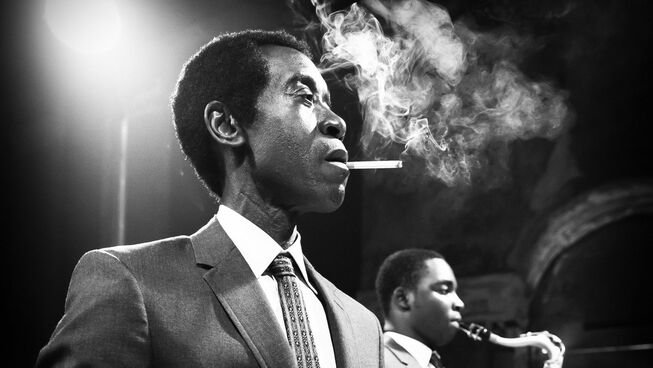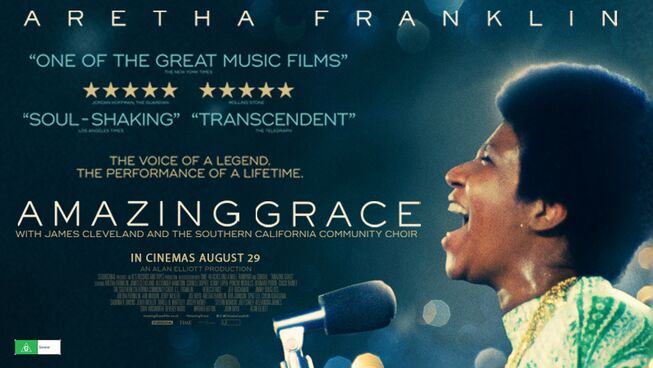
4 out of 5 stars
Aretha Franklin is an artist that managed to develop legendary status throughout her career and life. Her songs are regularly played around the world, she still has the number one Gospel album of all time and people around the globe know how to spell Respect because of this lady. Her biopic has been in the works for years and the biggest stumbling block was finding the performer who could sing Aretha’s story onto the big screen. Before the iconic singer passed away, she finally chose Dreamgirls Jennifer Hudson to take on the role.
Besides performing the groundbreaking songs from Franklin's discography, she needed to span the 20+ years depicted in the film. Jennifer Hudson brings to the performance not only her vocal abilities, but she manages to travel through the proverbial highs and extreme lows of Aretha’s career. Aretha lived with her father, C. L. Franklin (Forest Whitaker), in Detroit and would sing at their local church and evening parties at their family home. Even though Re (her family pet name) had the voice of an angel, some demons followed her after experiencing abuse and the loss of her mother at an early age. As she toured around the country to support her father’s ministry and social justice causes, the singer was eventually signed with New York-based recording label - Columbia.
As Aretha worked to find her own voice and style, she eventually came out of the control of her father. Yet, two other men took up the mantle of running her world. Her husband, Ted White (Marlon Wayans), managed her career and introduced her to the veteran record producer Jerry Wexler (Marc Maron) of Atlantic Records. Each of these men went on to provide good and bad roles in the life of Franklin. Still, they did help steer her along as she made the music that has defined her as a music legend. Despite having everything that the world has to offer thrown at her, she had to confront her darker side to survive the industry and live up to her status as the Queen of Soul.
There is more to share about Aretha Franklin’s life and career, but it is best left to the film to tell her story. One that weaves in fantastic live performances from Hudson with historical events that surrounded the artist as she lived through a time of significant social change in the world. Liesl Tommy does an admirable job in her directorial debut by guiding us through the multi-layered world of this recording artist. The musical numbers overpower the dramatic elements, but this all-star cast manages to lift the sluggish aspects of the screenplay out of the lethargic mire. Ultimately, it all rests on the shoulders of Jennifer Hudson. She takes on the role with captivating form and makes every song her own without stealing the glory from Franklin.
Respect is meant to highlight the career of a music idol while delivering a warning, similar to Ray and Walk the Line. Most great art usually comes through extreme trials and Aretha Franklin hits the low notes along with the higher ones. It is a film that does not tarnish her star as it humanises the woman at the centre of the story. This is especially true as she concludes her story by recording her biggest album and its signature song, Amazing Grace. Aretha's biography is filled with tragedy, celebration and is one worth seeing by all who love to delve into music history.
Reel Dialogue: Comparison of Aretha Franklin and Billie Holiday’s stories
Some may judge Respect as a sanitised version of the real story behind the artist. In comparison, The United States of America vs Billie Holiday took a different path and held nothing back from the viewer. Even though both women impacted the world of music, each has become an icon in her own right. What can be said about the filmmaking of both films is that they are attempting to capture different audiences. Holiday’s story of a childhood in a whorehouse, drug addiction, racism and abuse was meant to rip open history by viciously thrusting it upon the audience. On the other hand, Franklin's tale contained abuse, substance abuse and her role in social justice. Still, the makers of this film chose to make her story that is more accessible to a broader viewership.
What stands out as the decidedly different component is that Holiday’s journey was fraught with tragedy and lacked any hope. While Aretha’s proved to be a tale of redemption and grace, even though she was far from perfect. As she continually returned to her Christian faith as a means of finding peace. Both artists show how struggles are part of the pathway to greatness. Yet, Respect does more than show the difficulties of life by providing people with a hopeful answer to the hardship in life regardless of their position in life.
Take time to listen to Aretha’s version of Amazing Grace and if you would like to know more, click the link to discover where you can find this grace she sings of in her life.
Review of Amazing Grace film below








